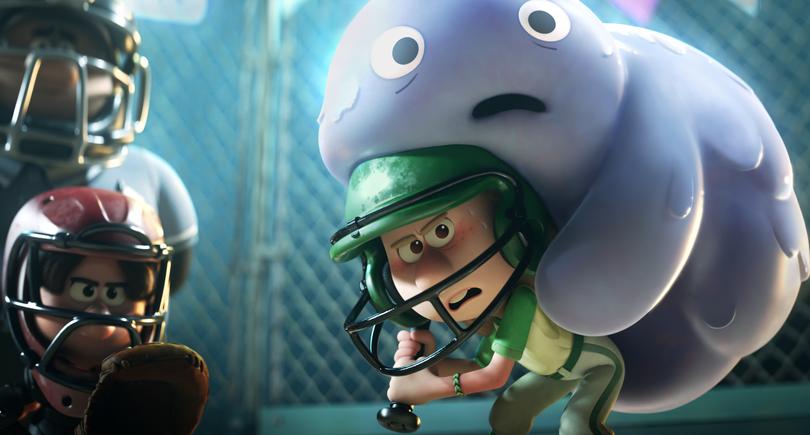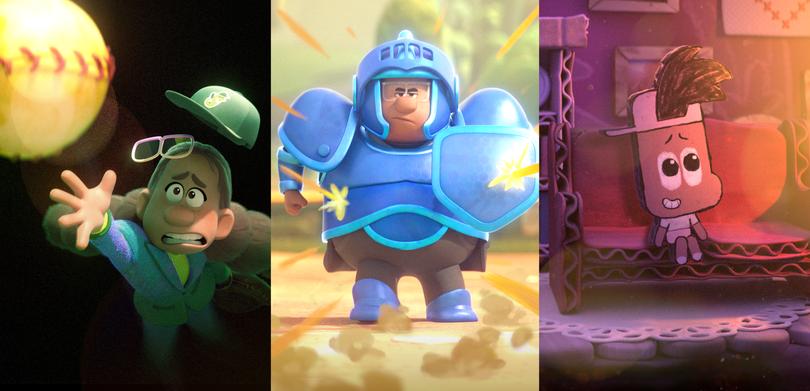Pixar’s Win or Lose at the centre of Disney’s acquiescence to right wing culture warriors
Win or Lose should be a triumphant moment for Pixar and Disney but instead it stands at the centre of a controversial change in values.

This week should be a triumphant one for Pixar. The Disney-owned animation powerhouse released its first original series Win or Lose and it’s actually a great show.
But rather than take the victory lap for the series, a dynamic, clever and warm story about a teenage softball team, it’s at the centre of a larger story about Disney’s capitulation to Donald Trump and right-wing forces of anti-inclusion.
Win or Lose was designed to reflect a diverse community with its characters hailing from different walks of life, just as many sports teams would in real life.
Sign up to The Nightly's newsletters.
Get the first look at the digital newspaper, curated daily stories and breaking headlines delivered to your inbox.
By continuing you agree to our Terms and Privacy Policy.There’s Rochelle (Milan Ray), a gun catcher who lives with her baby brother and her single mum, the vivacious Vanessa (Rosa Salazar). When the membership costs for the next season goes up unexpectedly, Rochelle contrives a scheme to meet those costs.
There’s Frank (New Zealand actor Josh Thomson), the referee and a school teacher who wears metaphorical armour around his broken heart, and Laurie (Rosie Foss), team member and the coach’s (Will Forte) daughter who has great anxieties over the fact she’s actually just not a very good ball player.
Each of its eight episode follows a different character’s perspective, all in the week leading up to the championship game. In the four episodes made available for review, the animation pops, the writing is great and it just has that magical Pixar touch.

So, what’s the problem?
One of the characters is Kai, who in the original version was a transgender girl. In December, it was revealed Disney had months earlier altered the character so that she would be cisgender, cutting lines of dialogue that referred to Kai’s gender identity. Kai’s episode was not one of the four released to critics.
A spokesperson at the time said, “When it comes to animated content for a younger audience, we recognise that many parents would prefer to discuss certain subjects with their children on their own terms and timeline.”
Chanel Stewart, the transgender actor who responded to a notice that Pixar was specifically looking to cast a transgender girl to voice the character said she was disheartened by the change.
She told Deadline at the time, “From the moment I got the script, I was excited to share my journey to help empower trans youth. I knew this would be a very important conversation. Trans stories matter, and they deserve to be heard.”
Stewart’s mum, Keisha, added, “There may be some parents out there who are not ready to have that conversation, but this is the world that we live in, and everyone should be represented.
“Everyone deserves to be recognised, and it felt like it was just another setback for the LGBTQ community because it’s very hard on transgender teenagers… transgender people, period.”
The episode is part of a wider wave of moves by Disney in the past year, acquiescing to conservative critics fighting a culture war against diversity and inclusion.
Not long ago, Disney was locked in battle with Florida’s Republican governor, Ron De Santis, over the state’s “Don’t Say Gay” legislation which banned schools from teaching anything to do with sexual or gender orientation.

Disney, which does huge business in Florida with its Orlando theme parks, came out against the law, declaring it antithetical to the company’s values of inclusion and acceptance.
Fast forward two and a bit years and the political winds have shifted, and Disney is bending.
It also settled for $US15 million a defamation lawsuit Trump brought against the company’s broadcast network, ABC, after one of its anchors, George Stephanopoulos, inaccurately asserted on-air that the then-former president had been found liable of “rape” in a civil suit brought by E. Jean Carroll. Under New York law, where Carroll’s case was decided, it is classified as “sexually abusing”.
Disney has also changed its diversity, equity and inclusion (DEI) efforts following the Trump administrations edict banning DEI programs in federal government agencies and bodies, as well as contractors.
Among those changes is the shuttering of the Reimagine Tomorrow website, which had highlighted stories from marginalised communities.
It also changed content warnings that appeared before older titles such as Dumbo and Peter Pan. It previously read, “This program includes negative depictions and or/mistreatment of people or cultures. These stereotypes were wrong then and are wrong now. Rather than remove this content, we want to acknowledge its harmful impact, learn from it, and spark conversation to create a more inclusive future together”.
Now, it says, “This program is presented as originally created and may contain stereotypes or negative depictions.”

